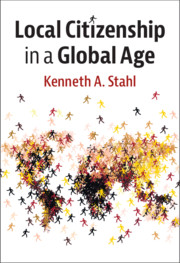Book contents
- Local Citizenship in a Global Age
- Local Citizenship in a Global Age
- Copyright page
- Dedication
- Contents
- Figures and Tables
- Acknowledgments
- Introduction
- Part I Citizenship Federalism
- Part II “Noncitizen Citizens”
- 4 Local Citizenship and Woman Suffrage
- 5 Local Citizenship for Noncitizen Residents
- 6 Local Citizenship for Nonresident Landowners
- 7 Globalization and the Collapsing Distinction between Local and Federal Citizenship
- Part III Race, Space, Place, and Urban Citizenship
- Conclusion
- Bibliography
- Index
6 - Local Citizenship for Nonresident Landowners
from Part II - “Noncitizen Citizens”
Published online by Cambridge University Press: 08 June 2020
- Local Citizenship in a Global Age
- Local Citizenship in a Global Age
- Copyright page
- Dedication
- Contents
- Figures and Tables
- Acknowledgments
- Introduction
- Part I Citizenship Federalism
- Part II “Noncitizen Citizens”
- 4 Local Citizenship and Woman Suffrage
- 5 Local Citizenship for Noncitizen Residents
- 6 Local Citizenship for Nonresident Landowners
- 7 Globalization and the Collapsing Distinction between Local and Federal Citizenship
- Part III Race, Space, Place, and Urban Citizenship
- Conclusion
- Bibliography
- Index
Summary
Chapter 6 describes how some local governments have given rights of citizenship, including voting rights, to nonresident landowners; in some cases, municipalities have actually limited the franchise exclusively to landowners. Once again, this is indicative of the distinctive nature of local citizenship. Property ownership ceased being a prerequisite for voting in state and federal elections by the 1850s, as citizenship was coming to be seen primarily in ethno-nationalist terms as a matter of shared identity. Local governments, reflecting their history as commercial entities, have been more open to tying the franchise to landownership, and as a de facto matter, many cities today use zoning regulations to ensure that anyone who cannot afford to purchase a home cannot acquire residence, and therefore the right to vote. This de facto property qualification for local citizenship illustrates that local citizenship is constructed as purely private and liberal, predicated upon consumer choice, mobility, and self-interest rather than identity or civic activity.
Keywords
- Type
- Chapter
- Information
- Local Citizenship in a Global Age , pp. 124 - 140Publisher: Cambridge University PressPrint publication year: 2020

